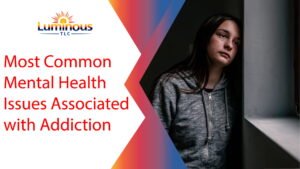
Substance abuse is strongly associated with the presence of mental disease. According to the available research, half or more of those who struggle with addiction also deal with a mental health condition. Intricate relationships exist between mental illness & drug abuse. Substance abuse often results from an underlying mental health condition that the individual is attempting to treat.
However, drug abuse may also bring on or exacerbate mental health problems. Issues with drug abuse and mental health might sometimes have a shared origin. It’s vital to check those who come in for treatment for drug misuse or comorbid mental health problems. Successful addiction rehabilitation requires simultaneous treatment of any co-occurring disorders. Finding a treatment centre with the resources to accommodate a dual diagnosis is essential.
Connection With Mental Health Issues And Addiction
The National Institute of Mental Health reports that those who suffer from mental health conditions, including depression, anxiety, and post-traumatic stress disorder (PTSD), are more likely to experiment with self-medicating with alcohol or drugs. Temporary alleviation from the signs of mental illness may result from this.
Common Problems Of Mental Health Issues And Addictions
- Disturbances of Anxiety
Anxiety disorders affected 301 million individuals worldwide in 2019, including 58 million children & adolescents (1). Anxiety disorder is characterized by abnormal patterns of behaviour associated with excessive dread and concern. These symptoms are causing you serious anguish or hindering your ability to perform.
- The Bipolar Spectrum
Approximately 40 million individuals worldwide suffered from bipolar illness in 2019. (1). People having bipolar disorder cycle between phases of depression and mania. Depressed mood (feeling sad, irritated, empty) or a lack of pleasure or interest in tasks characterize a depressive episode, which may last for most of the day, virtually every day.
Insomnia, irritability, increased activity or energy, increased talking, racing thoughts, inflated sense of self-worth, reduced need for sleep, attention deficits, and impulsive, risk-taking behaviour are all manifestations of manic symptoms.
- Schizophrenia
About 24 million individuals, or 1 in 300, have schizophrenia (1). Patients with schizophrenia often have a life span of 10–20 years lower than the normal population (4). Both perceptual and behavioural alterations are highly indicative of schizophrenia.
Persistent hallucinations, delusions, a lack of reality testing, excessive agitation, and cognitive or behavioural disorganization are all possible symptoms.
Revolutionary Therapies For Mental Health Issues
Individual, group, family, and marital psychotherapy, as well as behavioural therapies like hypnotherapy, relaxation training and exposure therapy, all fall under the umbrella term “psychotherapy.”
How Can We Help?
Treatment programmes at The Luminous Care are all-encompassing, cutting-edge, and compassionate, and they help people with both addiction and co-occurring illnesses. With a team of addiction professionals, including licenced and certified counsellors, board-certified psychiatrists, medical doctors, and a wide range of nurses and nursing assistants specializing in addiction, alcoholism, and co-occurring disorders, our drug and alcohol rehabilitation programme are one of a kind.
Call us now – 833-422-5585 or For more information enquire us